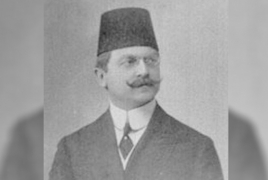
Multiple sources have told the tragic story of how British Prime Minister Boris Johnson’s great grandfather, prominent Ottoman-born Turkish journalist, editor and a liberal-leaning politician Ali Kemal was brutally murdered by Turkish nationalists back in 1922. He was arrested on charges of “subversive actions”.
Kemal, who was then the editor of the newspaper Sabah, was abducted from the Tokatliyan Hotel in Istanbul, where he had gone for a shave. According to verified sources, he was accused of wanting to bring to account the perpetrators of the 1915 Armenian Genocide, and for criticizing the nationalist movement that would establish the Turkish Republic in 1923.
Kemal is known for condemning the attacks on and massacres of the empire's Armenians during the First World War – the Armenian Genocide.
In an 18 July 1919 issue of the Alemdar newspaper, Ali Kemal Bey wrote: "... our Minister of Justice has opened the doors of prisons. Don't let us try to throw the blame on the Armenians; we must not flatter ourselves that the world is filled with idiots. We have plundered the possessions of the men whom we deported and massacred; we have sanctioned theft in our Chamber and our Senate. Let us prove that we have sufficient national energy to put the law into force against the heads of these bands who have trampled justice underfoot and dragged our honour and our national life through the dust." (from “Documentation of the Armenian Genocide in Turkish Sources” by Vahakn N. Dadrian)
When he was abducted from the Armenian hotel, he was supposed to be taken to Ankara for his trial. Instead, the agents of the Ottoman Empire's Special Organization took Kemal to the command post of Nureddin Ibrahim Pasha, the general who orchestrated his killing, in Izmit. Shortly after his interview by the commander, he was murdered with hammers and stones.
His death was covered by the world’s top press outlets, which said that the journalist was murdered by a mob after having been officially condemned to death.
“He was taken before General Nureddin Pasha, Military Governor of Smyrna, who pronounced the death sentence dramatically: “In the name of Islam, in the name of the Turkish nation, I condemn you to death as a traitor to the country.” Ali Kemal remained passive, uttering no word of protest. His hands tied, he was led to a scaffold. Before he reached the gibbet, however, an angry mob of women pounced on him, attacking him with knives, stones, clubs, tearing at his clothing and slashing his body and head with cutlasses,” the Associated Press reported in an article published a week after Kemal’s death.
Other reports suggest soldiers too participated in the lynching with the mob that attacked Kemal before his formal execution. A similar version of the story is written in the memoir of Rahmi Apak, a Turkish soldier and later politician who witnessed the event during his service as an intelligence chief.
According to 100-year-old reports, the editor’s death caused profound resentment and emotion in Constantinople, where he was known as one of Turkey’s most enlightened and most impartial citizens.
When Johnson was elected as the British PM, Turkish President Recep Tayyip Erdogan sent a letter, writing “e would like to welcome you in our country, which is your ancestor land.” Turkey, however, denies the history behind the persecution and lynching of Kemal — just like it still denies the Armenian Genocide.

